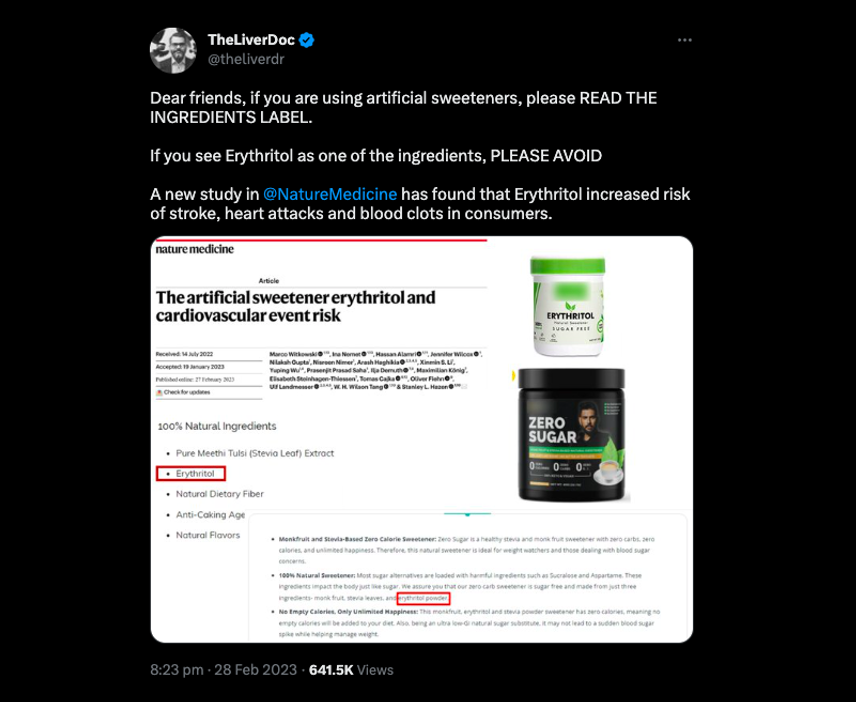Erythritol and Blood Clotting: Erythritol Blood Clots

Erythritol is a sugar alcohol commonly used as a low-calorie sweetener in various food and beverage products. It’s gaining popularity due to its sweet taste and negligible impact on blood sugar levels. However, recent research has raised concerns about its potential effects on blood clotting.
Erythritol’s Chemical Structure and Properties
Erythritol is a four-carbon sugar alcohol with the chemical formula C4H10O4. It’s a white, crystalline solid that’s highly soluble in water. Erythritol is naturally found in small amounts in fruits and fermented foods. It’s also produced commercially through fermentation processes using various sources like corn starch.
Potential Mechanisms of Erythritol’s Effect on Blood Clotting
The exact mechanisms by which erythritol might affect blood clotting are still being investigated. However, several potential pathways have been proposed:
Platelet Activation
Erythritol may activate platelets, which are tiny blood cells responsible for forming blood clots. Platelet activation leads to the release of various factors that contribute to clot formation.
Coagulation Cascade
Erythritol could potentially interfere with the coagulation cascade, a complex series of reactions that ultimately lead to the formation of fibrin, a protein that forms the meshwork of a blood clot.
Endothelial Dysfunction
Erythritol may also contribute to endothelial dysfunction, which refers to damage or impairment of the lining of blood vessels. Endothelial dysfunction can increase the risk of blood clots by promoting platelet activation and reducing the production of anti-clotting factors.
Research Findings on Erythritol and Blood Clotting Risk
Limited research has directly examined the relationship between erythritol consumption and blood clotting risk. However, some studies have observed associations that warrant further investigation:
Animal Studies
Studies in animals have shown that high doses of erythritol can increase the risk of blood clots. For example, a study in rats found that erythritol increased platelet aggregation and thrombus formation.
Human Studies
A recent study published in the journal “Nature Medicine” found that erythritol levels in the blood were significantly associated with an increased risk of heart attack, stroke, and blood clots in humans. However, this study was observational and did not prove a causal relationship.
It’s important to note that these studies are preliminary and more research is needed to fully understand the potential risks of erythritol consumption.
Health Implications and Considerations

While erythritol is generally considered safe for consumption in moderate amounts, recent studies have raised concerns about its potential impact on blood clotting. It’s crucial to understand the potential risks associated with erythritol consumption, especially for individuals with pre-existing health conditions.
Erythritol and Blood Clotting, Erythritol blood clots
Erythritol has been linked to an increased risk of blood clots, particularly in individuals with a history of cardiovascular disease. This is because erythritol can interfere with the body’s natural clotting mechanisms, potentially leading to the formation of blood clots in the arteries or veins.
While the exact mechanism by which erythritol influences blood clotting is still under investigation, some studies suggest that it may:
* Increase platelet aggregation: Erythritol may promote the clumping together of platelets, which are small cells in the blood that play a crucial role in blood clotting. This increased aggregation can lead to the formation of blood clots.
* Inhibit fibrinolysis: Fibrinolysis is the process by which blood clots are broken down. Erythritol may inhibit this process, allowing blood clots to persist and potentially grow larger.
* Alter the balance of clotting factors: Erythritol may disrupt the delicate balance of clotting factors in the blood, making it more likely for blood clots to form.
Erythritol and Individuals with a History of Blood Clots
Individuals with a history of blood clots, such as deep vein thrombosis (DVT) or pulmonary embolism (PE), should exercise caution when consuming erythritol. The potential risks associated with erythritol consumption may outweigh the benefits for these individuals. It’s essential to consult with a healthcare professional before incorporating erythritol into their diet.
Potential Benefits and Risks of Erythritol Consumption
| Factor | Potential Benefits | Potential Risks |
|—|—|—|
| Dosage | Sweetener with low calorie content | Increased risk of blood clots, especially in individuals with a history of cardiovascular disease |
| Individual Health Conditions | May be beneficial for individuals with diabetes or metabolic syndrome | Can worsen pre-existing conditions, such as heart disease or stroke |
| Potential Interactions with Medications | May interact with blood thinners or other medications | Can increase the risk of bleeding or other adverse effects |
It’s important to note that the information provided here is for general knowledge and should not be considered medical advice. It’s crucial to consult with a healthcare professional for personalized guidance regarding erythritol consumption and its potential risks and benefits.
Erythritol blood clots – The whispers of danger, of a silent enemy lurking within the sweetness, have reached a crescendo. Erythritol, the sugar substitute once hailed as a savior, now stands accused of a sinister plot – the formation of blood clots, a silent thief stealing life’s precious moments.
Like a rumbling Indian motorcycle tearing through the heartland, this news shakes us to our core, demanding answers and a reckoning with the unforeseen consequences of our choices. The investigation is ongoing, a race against time to understand the truth and protect ourselves from the shadow of this potential threat.
The whispers of a silent threat, erythritol blood clots, creep through the veins of unsuspecting individuals. While the world grapples with this insidious danger, a beacon of hope shines in the form of Dolton Mayor Tiffany Henyard , a leader who champions the health and well-being of her community.
Her unwavering dedication to public health may inspire a solution to this silent killer, a testament to the power of vision and leadership in the face of adversity.